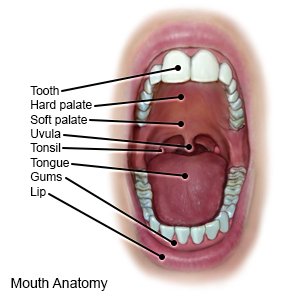Oral Lesion Excision
Medically reviewed by Drugs.com. Last updated on Aug 4, 2025.
What do I need to know about an oral lesion excision?
An oral lesion excision is surgery to remove a sore, ulcer, or patch (lesion) from inside your mouth. This includes the inner lip or cheek lining, gums, tongue, and floor and roof of the mouth. Removal may be the only treatment needed for the lesion, or may be part of your treatment plan.
 |
How do I prepare for surgery?
- Your surgeon will tell you how to prepare. He or she may tell you not to eat or drink anything after midnight on the day before surgery. Arrange to have someone drive you home after you are discharged.
- Tell your surgeon about all medicines you currently take. He or she will tell you if you need to stop any medicine for surgery, and when to stop. He or she will tell you which medicines to take or not take on the day of surgery.
- Tell your surgeon about all your allergies, including antibiotics or anesthesia.
Related medications
What will happen during surgery?
- You may be given general anesthesia to keep you asleep and free from pain during surgery. You may instead be given local anesthesia to numb the surgery area. You will be awake with local anesthesia, but you should not feel pain.
- Your surgeon may use a knife or laser to cut the lesion away. He or she will remove tissue that looks healthy from around and under the lesion. This helps make sure that as much of the lesion as possible is removed. Your surgeon may have the lesion tested to find out if it is benign (not cancer) or malignant (cancer).
- The area where the lesion was removed may need to be closed with stitches. This depends on where it was and how large an area was removed. Medicine may be put on the area to control bleeding. Gauze bandages may be packed over the area to keep it clean and prevent more bleeding.
What should I expect after surgery?
- You may have some bleeding, redness, or swelling near the surgery area. These are expected and should get better within a day or two.
- You may have trouble opening your mouth fully for a few days after surgery.
What are the risks of an oral lesion excision?
You may bleed more than expected or develop an infection. Depending on where the lesion is, removal may cause nerve damage. Your surgeon may not be able to remove all of the unhealthy tissue. Even with surgery, you may develop another oral lesion. Cancer cells may still spread or come back. You may have scarring from where the skin tissue was removed.
Care Agreement
You have the right to help plan your care. Learn about your health condition and how it may be treated. Discuss treatment options with your healthcare providers to decide what care you want to receive. You always have the right to refuse treatment. The above information is an educational aid only. It is not intended as medical advice for individual conditions or treatments. Talk to your doctor, nurse or pharmacist before following any medical regimen to see if it is safe and effective for you.© Copyright Merative 2025 Information is for End User's use only and may not be sold, redistributed or otherwise used for commercial purposes.
Further information
Always consult your healthcare provider to ensure the information displayed on this page applies to your personal circumstances.
